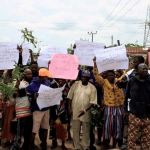The International Federation of Women Lawyers (FIDA) has raised alarm over a subtle yet rising form of domestic abuse, malice-keeping between spouses, describing it as a dangerous form of Gender-Based Violence (GBV) that is often overlooked.
FIDA made this assertion during a peer-learning and experiential sharing dialogue held in Lagos, themed “From Experience to Impact: Strengthening GBV Prevention Through Shared Learning.”
The dialogue, supported by the Ford Foundation, brought together traditional rulers, faith leaders, and state actors in a bid to tackle GBV at the grassroots level.
Panelists at the event spotlighted malice-keeping, where one partner deliberately ignores or emotionally distances themselves from the other, as a psychological form of abuse, especially affecting women.
According to FIDA, the emotional toll of such silent treatment often has long-term consequences on victims’ mental health.
The group urged communities, policymakers, and religious institutions to recognise and address this form of violence just as seriously as physical and sexual abuse.
Speaking during the panel discussion, Mrs Olafisayo Alani, Deputy Director of Social Welfare at the Lagos State Ministry of Women Affairs and Poverty Alleviation (WAPA), stressed the need for timely reporting of GBV cases.
“Whenever we have any case of GBV, just dial our hotline 767 to make a report. It is toll-free, and you can report anonymously.
“If you notice any form of GBV in your community, don’t stay silent, call and lodge a complaint,” she advised.
Highlighting the judicial challenges in tackling GBV, Chief Magistrate Bola Osunsanmi noted that many perpetrators walk free due to the reluctance of survivors to testify in court, particularly in cases involving sexual violence.
“One of the issues we face is survivors refusing to show up in court. This undermines the justice process and lets offenders go unpunished,” she said.
Osunsanmi encouraged survivors to take advantage of the witness protection provisions in the Administration of Criminal Justice Law (ACJL) 2021, which allows testimony to be given on camera to protect their identity and dignity.
“The law now allows survivors to testify privately, shielding them from public embarrassment or victim-blaming,” she emphasised.
In her opening remarks, Vice National President of FIDA, Mrs Eliana Martins, represented by the National Financial Secretary, Mrs Philomena Nneji, said the forum was a follow-up to previous dialogues held from October 2024 to June 2025.
Martins explained that the objective was to build on the outcomes of those engagements by equipping local leaders with practical tools and knowledge to challenge harmful gender norms and advocate for equality.
“These beneficiaries have been empowered to challenge traditional, religious, and gender norms that contribute to GBV.
“They are now better positioned to foster gender justice by leveraging local resources,” she stated.
She added that the experiential learning forum aimed to assess project impact, identify lessons learned, and document success stories from community interventions in focal states.
“Through this activity, we will gain key insights into the local realities of GBV prevention and use the feedback to shape future programs,” she said.
Martins also extended gratitude to the Ford Foundation for their continued support of the initiative.
The Chairperson of FIDA Ikeja Branch, Mrs Nnenna Eze, reported significant progress, stating that the organisation has achieved a 65 per cent success rate in its anti-GBV efforts so far.
However, she stressed the need for collective action to sustain and scale the impact.
“We must keep amplifying the success stories and pushing for the sustainability of this project.
“Our goal is to safeguard more women and girls from violence and discrimination across communities,” Eze stated.
READ MORE FROM: NIGERIAN TRIBUNE
WATCH TOP VIDEOS FROM NIGERIAN TRIBUNE TV
- Let’s Talk About SELF-AWARENESS
- Is Your Confidence Mistaken for Pride? Let’s talk about it
- Is Etiquette About Perfection…Or Just Not Being Rude?
- Top Psychologist Reveal 3 Signs You’re Struggling With Imposter Syndrome
- Do You Pick Up Work-Related Calls at Midnight or Never? Let’s Talk About Boundaries







